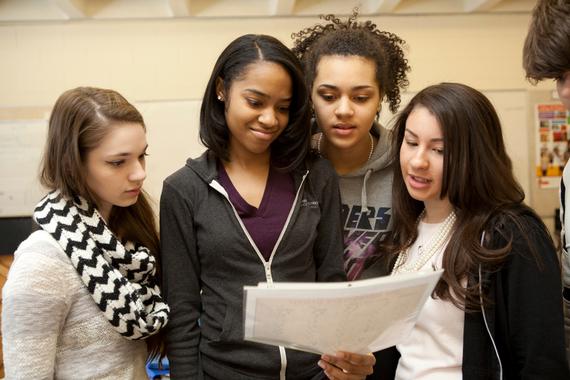Students are powerful agents of change. They have not only the most wisdom about the social dynamics of their schools, but also the most leverage with their peers. They can and should take leadership for creating more caring social norms. But they need adults to encourage their leadership. Adults can set up the right conditions, facilitate students in using the solutions they develop, and help spark ideas. In the process, youth can also develop important leadership skills, and adults can learn from their experience and perspective.
Try this:
- In middle and high school, charge the student council with making a caring, safe school culture for all students its main goal. If that is not feasible, create a volunteer committee comprised of students who will work together to create a positive school community. Include those who are social leaders as well as students who tend to be on the margins. Use this committee to generate ideas and to help implement solutions.
- Engage all students in the school to create either individual or group projects that enable students to build a more caring and just school community. Every student needs opportunities to think deeply about what it means to be caring and respectful, both as an individual and as a member of the school community. Individual or group projects are a great way to provide these opportunities and to ensure that every student—not just those in leadership roles—is engaged. Adults should approve and facilitate projects, being sure to lead conversations with students about what they learned and how they will apply it to change their own behavior and the school at large. Examples of possible projects include creating a video that examines a specific topic like cyberbullying or homophobia, writing biographies of peers or adults in the building—whether teachers, the school secretary, or the custodian—that students don’t know well, or interviewing other students and adults about what makes for a just community. These projects might be part of courses or advisory periods, or they might be generated in after-school programs.
- Campaign to end hurtful language. Too often no one intervenes when students use language that clearly degrades others, such as "That's so gay." Intervening is certainly not easy, and often neither adults nor students know exactly what to say to be effective. Enlist students themselves, both social leaders and students who tend to be isolated or may have been socially marginalized, to tackle this type of everyday degradation. Gather their ideas about what might work. Students might, for example, track most commonly used slurs and derogatory actions, then create signs to post on their lockers and in classrooms symbolizing a ban on this language. Students might role-play possible responses to help them react effectively when they hear hurtful language. Students, teachers, and administrators might also brainstorm together what school adults can do to reduce this language and to make everyone in the building aware of why it is harmful.
There are many ways to build caring communities. Efforts that tap the wisdom of youth and put young people front and center are far more likely to be effective.
How does your school empower students to create a caring community? Comment below!
Download a How-To Guide to School Climate Committee from Making Caring Common.
Find ideas to encourage moral reflection with the Making Caring Common How-To Guide to Caring Community Youth Capstone.
Discover resources to help young people talk about the importance of participation in our communities, nation, and world.


